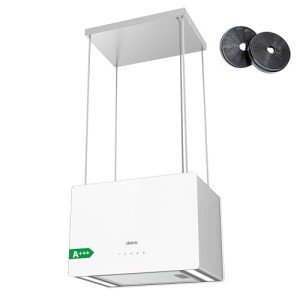You'll Never Guess This Kitchen Island Extractor's Tricks
페이지 정보
작성자 Marguerite 작성일25-05-18 12:01 조회82회 댓글0건관련링크
본문
The Essential Guide to Kitchen Island Extractors: A Comprehensive Overview
In modern-day kitchen style, the kitchen island has actually emerged as a central feature, serving both visual and practical purposes. To improve the cooking experience, lots of homeowners are opting for kitchen island extractors, which not only get rid of cooking smells however also contribute to the kitchen's general style. This post will explore numerous elements of kitchen island hood kitchen extractors, including their benefits, types, setup factors to consider, and maintenance. Furthermore, typical FAQs will likewise be addressed to supply a clearer understanding of this ingenious kitchen function.
Understanding Kitchen Island Extractors
Kitchen island extractors are ventilation systems installed above kitchen islands that assist in getting rid of smoke, steam, and odors produced throughout cooking. Unlike conventional hoods that are installed against walls, island extractors hang from the ceiling, making them perfect for open-plan layouts that feature a central kitchen island kitchen hood.
Benefits of Kitchen Island Extractors
Improved Air Quality: Best matched for busy kitchens, island cookers extractors substantially improve the air quality by straining airborne impurities.
Enhanced Aesthetics: Available in different styles and finishes, these extractors can complement a kitchen's design, including a touch of sophistication.
Area Optimization: They maximize counter area, as they do not need wall mounting, enabling for more versatility in kitchen style.
Personalized: Many designs use adjustable fan speeds, lighting functions, and an option of ducted or recirculating options to suit individual requirements.
Kinds Of Kitchen Island Extractors
1. Ducted Extractors
Ducted kitchen island extractors are linked to a duct system that vents air exterior. They are typically preferred for their efficiency in getting rid of smoke and smells.
Pros:
- Better air quality
- More efficient at smell removal
- Quiet operation
Cons:

- More complicated installation
- Requires structural modifications
2. Recirculating Extractors
Recirculating extractors filter air through charcoal or grease filters and return the purified air back into the kitchen. These are perfect for spaces where ductwork isn't practical.
Pros:
- Easier installation
- Less invasive
Cons:
- Less efficient at smell removal
- Regular filter replacements needed
3. Downdraft Extractors
Downdraft extractors are incorporated into the counter top and increase up during usage. Although they are not as popular as conventional hoods, they are a great alternative for minimalistic designs.
Pros:
- Space-saving design
- Ideal for particular layouts
Cons:
- Less efficient compared to traditional extractors
- Higher setup expenses
| Type | Pros | Cons |
|---|---|---|
| Ducted | Outstanding air quality, quiet | Complex installation |
| Recirculating | Easy setup, less intrusive | Routine filter changes needed |
| Downdraft | Space-saving, streamlined style | Higher expenses, less effective |
Installation Considerations
Setting up a kitchen island extractor [https://Lathebangle2.bravejournal.net/10-facts-about-island-extractor-fan-kitchen-that-will-instantly-put-you-in-an] requires mindful planning. Here are some important aspects to remember:
Height: The ideal height for setting up an extractor is 30-36 inches above the cooking surface. For gas ranges, the height should be closer to 36 inches.
Size: Ensure the extractor is 6-12 inches broader than the cooktop on all sides for ideal efficiency.
Ducting: If going with a ducted extractor, plan for duct positioning. This may need ceiling alterations or additional building work.
Electrical Supply: Ensure compliance with local codes and policies when installing electrical components for lighting and motor functions.
Design Compatibility: Consider the kitchen's total style theme and select an extractor that harmonizes with existing components.
Upkeep and Care
To make sure optimum performance, regular maintenance of kitchen island extractors is necessary. Here are some ideas:
Clean Filters Regularly: Depending on the kind of extractor, filter cleaning or replacement should be done every 1-3 months.
Examine the Motor: Regularly examine the motor and fan for debris accumulation and guarantee they are working properly.
Oil Moving Parts: Lubrication will extend the life of your extractor and minimize noise levels.
Examine for Duct Blockages: If you have a ducted system, periodically examine for wiki.eqoarevival.com any clogs or damage to the ductwork.
FAQs About Kitchen Island Extractors
1. How do I pick the right size extractor for my kitchen?
Selecting the ideal size extractor includes measuring the width of your cooktop and making sure the extractor is 6-12 inches larger on either side.
2. Are kitchen island extractors noisy?
A lot of modern-day kitchen island extractors are designed for peaceful operation, especially at lower fan speeds. However, sound levels can vary based upon model and settings.
3. What is the average expense of a kitchen island extractor?
Prices can range cooker island from ₤ 200 to over ₤ 2,000, depending on the brand name, type, and features. Setup expenses will differ based on local labor rates and the complexity of the setup.
4. Can I set up an extractor myself?
While some property owners go with DIY setup, it is suggested to hire an expert, especially for ducted systems, to guarantee safety and compliance with local codes.
5. How typically should I have my kitchen island extractor serviced?
An annual service by an expert is suggested for ducted systems to check for obstructions, while recirculating systems need to have filters changed every few months.
In conclusion, kitchen island hob extractor extractors are both useful and trendy services for modern-day kitchen areas. With different types, setup factors to consider, and maintenance needs, https://worldaid.eu.org/ it's important for homeowners to educate themselves about the different alternatives available. By choosing the ideal extractor, they can produce an enjoyable cooking environment and enhance the kitchen's functionality and appearance.

댓글목록
등록된 댓글이 없습니다.












